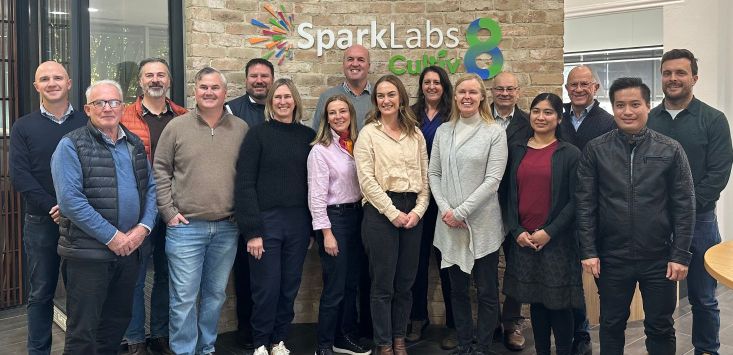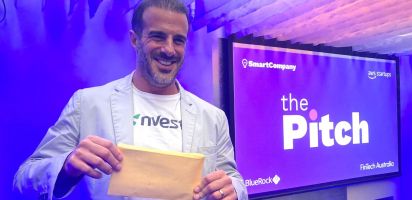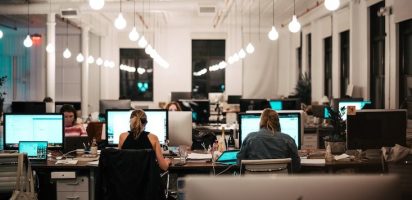
Image" SparkLabs Cultiv8
AgTech accelerator SparkLabs Cultiv8 has launched a new program focusing specifically on cleantech startups. Based out of Orange, the six-month accelerator aims to help the Australian cleantech sphere flourish.
SparkLab’s Cultiv8 was first launched in 2017, it has now supported 50 companies in the space, which has resulted in half a billion dollars raised and more than 750 jobs created in the sector.
The new accelerator is in partnership with its VC arm, Cultiv8 Funds Management and Challenger Group. It has also garnered support from the Department of Primary Industries, Meat and Livestock Australia (MLA), Grains Research and Development Corporation (GRDC), Agriculture Innovation Australia (AIA) and more.
According to SparkLabs, the startups will be involved in a five-phase program model delivered over six months designed to help them innovate and expand. During that time they will have access to labs, scientists and engineers, and agricultural trial sites.
Get daily business news.
The latest stories, funding information, and expert advice. Free to sign up.
They will also receive mentorship, business resourcing support, access to investors, networking opportunities and a financial contribution.
“A key focus of the accelerator program is to connect startups with the right expertise, customers, and investors to expand their network and subsequently enhance the entire CleanTech innovation ecosystem. While the face-to-face orientation week in Orange is the first opportunity to connect with industry networks, there are also a series of considered and scheduled events, along with bespoke meetings arranged throughout the program for companies to network, collaborate, and build connections,” Malcolm Nutt, co-founder of SparkLabs Cutiv8, said in an email to SmartCompany.
“The final week of the program returns to Orange for the regional Demo Day. With our extensive connections in funds management and high net wealth clients, the event provides participants with an opportunity to meet selected investors, present their pitch to a large investor audience and positions themselves to seek future funding.”
The majority of the startups in this cohort are from New South Wales. These include:
- AusBioEnergy: a closed-loop manufacturing system to produce competitively priced, scalable and sustainable biomethanol.
- Blue Carbon S2C: which focuses on developing and financing blue, teal and green carbon projects that help to restore large-scale nature-based ecosystems.
- Carbonaught: delivering organic fertiliser derived from enhanced rock weathering to permanently remove carbon dioxide from the atmosphere and promote sustainable agriculture.
- Clean Eyre Global: a land-based Asparagopsis seaweed production business committed to accelerating the commercialisation of ruminant animal feed supplements to reduce greenhouse gas emissions.
- DownForce Technology: a novel platform for precise and efficient calculation of natural capital and ecosystem services, empowering farmers and land stewards.
- ExoFlare: a platform for the food and agricultural industries to evaluate and manage biosecurity hazards in real time while adhering to reporting standards.
- NanoSoils: uses silica nanoparticles to directly administer agrochemicals to plants, reducing pesticide residues in the environment.
- Packamama: has reinvented the wine bottle to make it more climate-friendly. Savings in space, weight and energy mean better bottles that slash carbon emissions in the supply chain.
- Ten Carbon Chemistry: has developed unique antimicrobials that are in trials on fresh produce to extend shelf life; on packaging to improve safety and reduce emissions as well as other industrial, agricultural and hygiene industry applications.
- Wollemi: has developed a platform that automates scenario analysis and climate vulnerability assessment, enabling seamless integration of climate risk into decision-making. Their technology quantifies and reports climate risks for land-based and agricultural assets, from asset to portfolio level.
Over the last couple of years there has been a rise in support for regional startups, with more focus and resources being poured into the regions, particularly in the wake of Covid. In addition to startups not needing to necessarily be in a capital city anymore, there is an advantage to startups that have a focus on areas like agtech and cleantech being in the heart of the areas where their innovations make the most impact.
“Through SparkLabs Cultiv8’s regional NSW location, we have the opportunity to directly connect the global and broader Australian clean technology ecosystem to regional NSW,” Nutt said.
“The program’s onsite induction week promotes reciprocal idea generation between entrepreneurs, researchers, customers and industry partners, to identify the diverse opportunities that can be accessed across regional and metropolitan locations, both domestically and internationally. This input of differing perspectives captures feedback from those facing these issues on the ground, and expedites the development of clean technologies in regional areas and enhances the knowledge and skills of the whole community.”
Handpicked for you

Austrade’s NYC accelerator for Aussie fintechs with an empire state of mind




COMMENTS